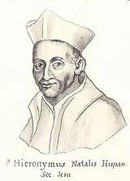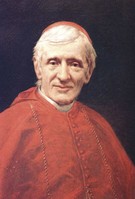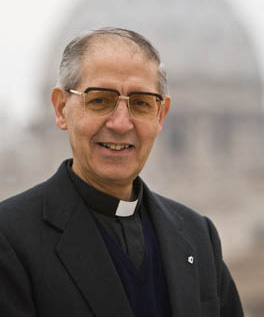Terms: A | B | C | D | E | F | G | H | I | J | K | L | M | N | O | P | Q | R | S | T | U | V | W | X | Y | Z
Jesuit Terms N
Nadal, Jerome [Jeronimo in Spanish] (1507-1580)
Spanish Jesuit; promulgator of the Constitutions
 Ignatius sent Nadal as his trusted ambassador to Italy, Spain, Portugal, Germany, and Austria to promulgate and explain the newly-composed Constitutions of the order.
Ignatius sent Nadal as his trusted ambassador to Italy, Spain, Portugal, Germany, and Austria to promulgate and explain the newly-composed Constitutions of the order.
Nadal made use of the new medium of perspective illustrations to enhance the realism of Pictures of the Gospel Stories. Matteo Ricci took this work with him to China and thus introduced the art and science of perspective to that forbidden country.
Nadal is considered by historian John O'Malley to be one of the three absolutely central figures (along with Juan de Polanco and Ignatius himself) in the founding and early development of the Society of Jesus (The First Jesuits [Harvard, 1993]).
Natural Law
Over the centuries Catholic scholars have understood natural law as something that can be reached by human reason alone and that is valid for all times and places. But when one looks into particulars, the tradition has not produced an agreed-on body of specific teachings. Indeed it has had to reverse its teaching on a good number of important issues like usury, slavery, democracy, religious liberty, and the role of procreation in marriage. The working paper in preparation for the fall 2014 Synod on the Family, based on a worldwide survey, concludes that "the concept of natural law today . . . is highly problematic, if not completely incomprehensible," yet insists that a proper understanding of natural law can be convincing.
In the 20th and 21st centuries the papal magisterium has increasingly supported its moral teachings—especially its teaching on sexual morality (though not its social justice teaching)—on its own authority and that of its predecessors. Thus in his encyclical letter sustaining the intrinsic immorality of artificial contraception and rejecting the recommendation for change by the commission his predecessor had established, Pope Paul VI stated that the report had "departed from the moral teaching on marriage proposed with constant firmness by the teaching authority of the Church" (Humanae vitae, 1968).
See "Infallibility"
See "Magisterium"
New Testament
Newman, John Henry (1801-1890)
Cardinal, beatified, British educator and theologian, writer, orator
 Born in London, Newman was the eldest of a family with three sons and three daughters. At the age of 15 he attended Trinity College, Oxford, where he received his bachelor's degree. He held academic pastoral assignments, having been ordained as an Anglican clergyman and serving as a teacher at Oxford University. Founder of the Oxford Movement (whose members often wished to return the Church of England to many Catholic beliefs and forms of worship traditional in medieval times), he eventually became a Catholic in 1845 and was ordained in the Catholic Church in 1847.
Born in London, Newman was the eldest of a family with three sons and three daughters. At the age of 15 he attended Trinity College, Oxford, where he received his bachelor's degree. He held academic pastoral assignments, having been ordained as an Anglican clergyman and serving as a teacher at Oxford University. Founder of the Oxford Movement (whose members often wished to return the Church of England to many Catholic beliefs and forms of worship traditional in medieval times), he eventually became a Catholic in 1845 and was ordained in the Catholic Church in 1847.
In 1854, Newman went to Dublin as rector of the newly established Catholic University of Ireland, which evolved into the University College, Dublin, the largest university in Ireland. It was here that he published a volume of lectures, The Idea of a University, which explained his philosophy of education. For instance, he described knowledge as, "The indispensable condition of expansion of mind, and the instrument of attaining to it" and the importance of a wide range of academic possibilities. Pope Leo XIII made him a cardinal in 1879. Pope Benedict XVI beatified him in Birmingham, England, on September 19, 2010.
Back to top
Nicolás, Adolfo (1936-2020)

Thirtieth superior general of the Society of Jesus* (the Jesuits*), elected in 2008, he served until his retirement at age 80 in 2016.
As superior general, Fr. Nicolás exuded joy with his staff in their serving the Society together. In his spiritual leadership, he asked Jesuits "to go more deeply, see prayer more imaginatively, and confront what distracted them from the more abiding good in their lives and labors" (Howard Gray).
In a major address (Mexico City, 2010), he challenged lay and Jesuit leaders in higher education from around the world:
First, in response to the globalization of superficiality, I suggest that we need to study the emerging cultural world of our students more deeply and find creative ways of promoting depth of thought and imagination. . . . Second, in order to maximize . . . new possibilities of communication and cooperation, I urge the Jesuit universities to work towards operational international networks that will address important issues touching faith, justice, and ecology. . . . Finally, to counter the inequality of knowledge distribution, I encourage a search for creative ways of sharing the fruits of research with the excluded; and in response to the global spread of secularism and fundamentalism, I invite . . . a renewed commitment to the Jesuit tradition of learned ministry which mediates between faith and culture.
Challenges to Jesuit Higher Education Today
Superior General Adolfo Nicolás, SJ
Mexico City, April 23, 2010
A Call for Spiritual Leadership – shared values, selflessness, freedom, generosity
Nineteenth Annotation Retreat
Also called "The Spiritual Exercises in Everyday Life"
Ignatius Loyola foresaw that not everyone would be able to make his full Spiritual Exercises by withdrawing from home and work and devoting 30 days full-time to them. He thus asked people making the Exercises part-time to do two things: (1) to set aside an hour daily for prayer (but this like so much in the Exercises is adaptable to the individual person) and (2) to see a guide for processing what is happening in the prayer and the rest of life and to get individualized guidance every week or two. This process would continue for seven months or more, a large commitment. (In this version one week part-time equals about one day full-time.)
Ignatius wrote about this possibility in "Annotation 19," one of the "Introductory Observations" at the beginning of the book of the Exercises. Most lay people who make the full Exercises today do so in this extended way.
Back to top
Nostra Aetate
Nostra Aetate (Latin for "In Our Time" or "In Our Age"), Vatican Council II's Declaration on the Relation of the Church with Non-Christian Religions, is a statement on interreligious dialogue promulgated on October 28, 1965, by Pope Paul VI.
See the document which includes:
- a statement on the unity of the origin of all people
- the will of the Catholic Church to respect other religions
- a description of some commonalities of Islam, Christianity and Catholicism
- an account of the bond that ties Christians to Jews and a denunciation of
anti-Semitism
Beyond Nostra Aetate
Important as Nostra Aetate has been for Jewish-Catholic relations over the past 50 years, the document left certain issues unresolved. Now a new document (2015) from the Commission of the Holy See for Religious Relations with the Jews addresses some of these. Titled The Gifts and Calling of God are Irrevocable, it asserts that Catholics should not try to convert Jews; Jews can be saved without believing in Christ (how this can be is a "mystery"). It is clear that both Judaism and Christianity must be understood on their own terms.
According to Edward Kessler of the Woolf Institute, Cambridge, here are questions Jews need to address:
What was the divine purpose behind the creation of Christianity? What are the implications for Jews that, as a result of the Jew Jesus, 2 billion Christians now read the Jewish Bible?... My own view is that the covenant promised to Abraham and revealed to Moses demonstrates not only an irrevocable relationship between the Jewish people and God but also allows the theological space for Christians to possess their own special relationship with God and to see their reflection in a Jewish mirror.
A group of Orthodox rabbis recently issued a declaration stating: "We acknowledge that Christianity is neither an accident nor an error, but the willed divine outcome and gift to the nations. In separating Judaism and Christianity, God willed a separation between partners with significant theological differences, not a separation between enemies."
For more information, see the Nostra Aetate resource page.
Novitiate/Novice
The stages of Jesuit formation
The first two years of a Jesuit's formation. A novice engages in the study of Jesuit history and Jesuit life (including the vows common to all forms of religious life), the making of the full Spiritual Exercises over 30 days, and other "experiments" like insertion among the poor, work in hospitals, going on pilgrimage, work in a Jesuit-sponsored ministry while living in community with Jesuits who have completed their course of (early) formation.
See also Stages of Formation, First Studies, Regency, Theology, and Tertianship.
